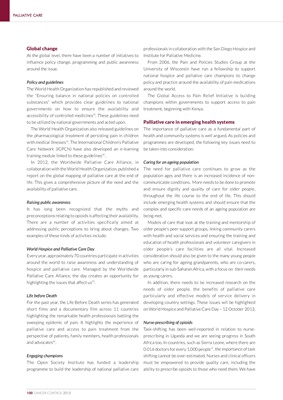
PALLIATIVE CARE
Global change professionals in collaboration with the San Diego Hospice and
At the global level, there have been a number of initiatives to Institute for Palliative Medicine.
influence policy change, programming and public awareness From 2006, the Pain and Policies Studies Group at the
around the issue. University of Wisconsin have run a fellowship to support
national hospice and palliative care champions to change
Policy and guidelines policy and practice around the availability of pain medications
The World Health Organization has republished and reviewed around the world.
the “Ensuring balance in national policies on controlled The Global Access to Pain Relief Initiative is building
substances” which provides clear guidelines to national champions within governments to support access to pain
governments on how to ensure the availability and treatment, beginning with Kenya.
32
accessibility of controlled medicines . These guidelines need
to be utilized by national governments and acted upon. Palliative care in emerging health systems
The World Health Organization also released guidelines on The importance of palliative care as a fundamental part of
the pharmacological treatment of persisting pain in children health and community systems is well argued. As policies and
33
with medical illnesses . The International Children’s Palliative programmes are developed, the following key issues need to
Care Network (ICPCN) have also developed an e-learning be taken into consideration:
34
training module linked to these guidelines .
In 2012, the Worldwide Palliative Care Alliance, in Caring for an ageing population
collaboration with the World Health Organization, published a The need for palliative care continues to grow as the
report on the global mapping of palliative care at the end of population ages and there is an increased incidence of non-
life. This gives a comprehensive picture of the need and the communicable conditions. More needs to be done to promote
availability of palliative care. and ensure dignity and quality of care for older people,
throughout the life course to the end of life. This should
Raising public awareness include emerging health systems and should ensure that the
It has long been recognized that the myths and complex and specific care needs of an ageing population are
preconceptions relating to opioids is affecting their availability. being met.
There are a number of activities specifically aimed at Models of care that look at the training and mentorship of
addressing public perceptions to bring about changes. Two older people’s peer support groups, linking community carers
examples of these kinds of activities include: with health and social services and ensuring the training and
education of health professionals and volunteer caregivers in
World Hospice and Palliative Care Day older people’s care facilities are all vital. Increased
Every year, approximately 70 countries participate in activities consideration should also be given to the many young people
around the world to raise awareness and understanding of who are caring for ageing grandparents, who are co-carers,
hospice and palliative care. Managed by the Worldwide particularly in sub-Saharan Africa, with a focus on their needs
Palliative Care Alliance, the day creates an opportunity for as young carers.
highlighting the issues that affect us35. In addition, there needs to be increased research on the
needs of older people, the benefits of palliative care
Life before Death particularly and effective models of service delivery in
For the past year, the Life Before Death series has generated developing country settings. These issues will be highlighted
short films and a documentary film across 11 countries on World Hospice and Palliative Care Day – 12 October 2013.
highlighting the remarkable health professionals battling the
sweeping epidemic of pain. It highlights the experience of Nurse-prescribing of opioids
palliative care and access to pain treatment from the Task-shifting has been well-reported in relation to nurse-
perspective of patients, family members, health professionals prescribing in Uganda and we are seeing progress in South
36
and advocates . Africa too. In countries, such as Sierra Leone, where there are
0.016 doctors for every 1,000 people37, the importance of task
Engaging champions shifting cannot be over-estimated. Nurses and clinical officers
The Open Society Institute has funded a leadership must be empowered to provide quality care, including the
programme to build the leadership of national palliative care ability to prescribe opioids to those who need them. We have
100 CANCER CONTROL 2013